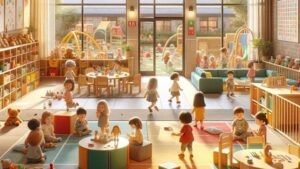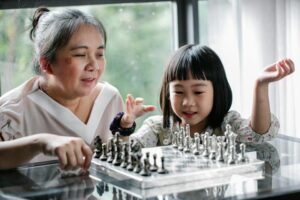
Daycare Advice for Parents: How to Choose a Safe Daycare
Get essential daycare advice for parents on choosing a safe daycare. Learn safety tips, regulations, and how to ensure a secure environment for your child.

Determining the best age for daycare is about more than convenience; it impacts your child’s emotional and social development. Experts agree that children benefit most when they enter daycare at an age that aligns with their developmental milestones and individual needs. Practical daycare advice for parents helps them make informed decisions based on these factors.
For instance, infants between 6 and 12 months can benefit from social interaction and sensory experiences in daycare. However, the transition might be smoother if the child is already comfortable being cared for by someone other than their parents. On the other hand, toddlers (ages 1-3) often thrive in daycare environments that encourage socialization and structured play.
According to a study by the National Institute of Child Health and Human Development (NICHD), children who enter daycare before the age of 1 can develop strong social skills, but this also depends on the quality of care provided. Choosing the right age helps minimize separation anxiety and sets the stage for a positive daycare experience.
Several factors influence the decision of when to start daycare. Understanding these factors helps parents make a choice that suits their child’s needs. Here’s key daycare advice for parents to consider:
1. Emotional Readiness: Assess your child’s ability to handle separation. Younger infants may adapt quickly, but some children may need more time to feel secure without their primary caregivers.
2. Social Development: If your child shows interest in interacting with peers, daycare can provide valuable socialization. Toddlers, in particular, benefit from group play and cooperative activities.
3. Family Circumstances: Work schedules, financial considerations, and parental leave policies often influence the decision. Understanding how daycare fits into your family’s routine is essential.
4. Health and Immunity: Younger infants have developing immune systems. Ensuring your child is up-to-date on vaccinations and that the daycare follows hygiene protocols can alleviate health concerns.
By weighing these factors, parents can decide on the best age for daycare, ensuring a positive and supportive environment for their child.
Daycare centers play a crucial role in supporting children at different stages of development. Whether caring for infants, toddlers, or preschoolers, experienced daycare providers tailor their programs to meet each child’s needs. Understanding how daycares support different age groups offers valuable daycare advice for parents.
Infants (6-12 months): Daycares provide sensory activities, tummy time, and one-on-one interactions to support early development. Consistent routines help infants feel secure and cared for.
Toddlers (1-3 years): Daycares encourage language development, motor skills, and socialization through group play, storytelling, and creative activities. Structured schedules help toddlers develop a sense of routine and independence.
Preschoolers (3-5 years): At this stage, daycares focus on preparing children for kindergarten. Activities like early literacy, basic math, and cooperative play help develop cognitive and social skills.
By understanding these age-specific approaches, parents can choose a daycare that aligns with their child’s developmental needs, ensuring a nurturing and enriching experience.
When parents choose the appropriate age for daycare, it benefits not only their child but also the daycare center. Matching children’s developmental stages with suitable programs helps daycares provide better care and maintain a harmonious environment. Here’s how this benefits daycares:
1. Better Child Adaptation: Children who are developmentally ready for daycare adapt more quickly, reducing stress for both the child and the caregivers. This allows staff to focus on providing quality care.
2. Balanced Classrooms: When children are grouped by appropriate ages, daycares can create balanced classrooms that facilitate effective learning and play. This improves the overall daycare experience.
3. Positive Parent-Provider Relationships: When parents receive sound daycare advice and feel confident about their choice, it strengthens trust and communication with the daycare. Satisfied parents are more likely to recommend the daycare to others.
4. Improved Outcomes: Providing care that matches children’s developmental stages leads to better social, emotional, and cognitive outcomes, enhancing the daycare’s reputation and success.
Choosing the right age benefits everyone involved, creating a positive and supportive daycare environment.

Get essential daycare advice for parents on choosing a safe daycare. Learn safety tips, regulations, and how to ensure a secure environment for your child.

Ensure you’re selecting the best daycare with our comprehensive parent checklist. Get crucial daycare advice for parents to make an informed and confident choice.

Practical daycare advice for parents on preparing their autistic child for a successful and comfortable transition into daycare.

Get essential daycare advice for parents on deciding between a nanny and daycare. Understand the pros, cons, and key factors to make the best choice for your child.